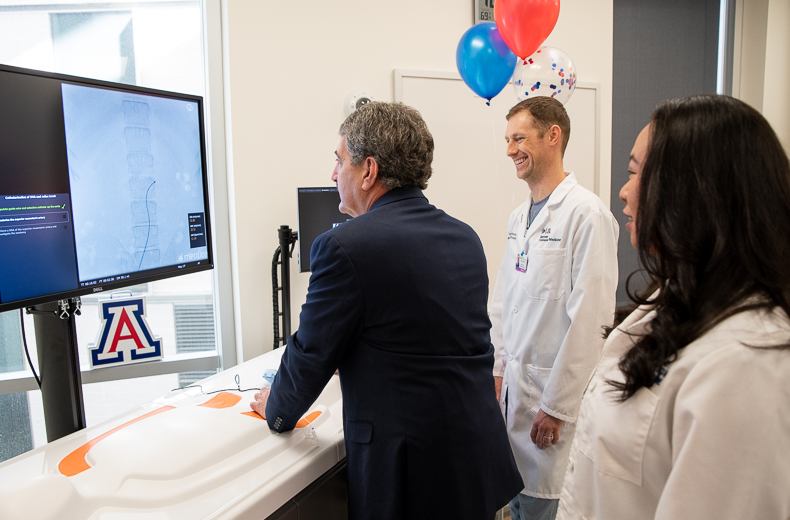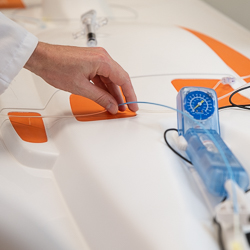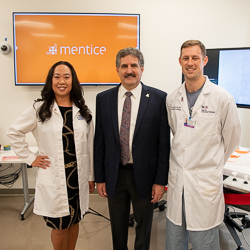
Medical Students Use Virtual Reality Trainer to Perform Endovascular Procedures

University of Arizona College of Medicine – Phoenix students and residents are learning to perform intricate surgeries with the use of a virtual reality simulator called Mentice.

Physicians often traverse blood vessels in a wide-range of treatments such as closing off an aneurysm, stopping a hemorrhage, treating a heart attack or targeting cancer. Previously, physicians would have needed to operate on a skull or perform open heart surgery to get to the source of the problem.
Now they can perform the procedure through an incision in the skin that’s the size of a pinhole. The result is less cost and faster recovery for patients.
But physicians must first be trained to use the device.
Although less invasive, going through the vessels of the body can be a challenging task for a physician. If performed incorrectly, damage to the blood vessels and a variety of other complications can arise. This makes procedural training vital for patient care.
“Would you ever want a doctor to learn how to do a procedure for the first time on you?” asked Teresa Wu, MD, director of the Simulation Curriculum at the College of Medicine – Phoenix. "Of course not.
"This equipment allows us to train our health care professionals on high-fidelity mannequins and virtual reality trainers, so they don't have to practice on live patients,” she said. “Interventional physicians and surgeons save lives, and this equipment will help our providers provide the best care possible.”

“This is the future of patient care,” Dr. Wu said. “One day soon, doctors will be able to get a CT or MRI of their patient and have this data uploaded onto a virtual reality system, where they can view that individual patient’s anatomy and practice the requisite procedure first with VR. By the time they operate on the patient, they will have practiced the procedure multiple times. It can be lifesaving.”
The Mentice simulator was provided to Dr. Wu and Chris Goettl, MD, an interventional radiologist and clinical assistant professor at the college, through a Provost Grant. The device will train students, residents, fellows and practitioners.
Drs. Wu and Goettl plan to conduct research to study the effectiveness of training early learners with the Mentice device, and measure its impact on attracting students to new and exciting fields of medicine.
About the College
Founded in 2007, the University of Arizona College of Medicine – Phoenix inspires and trains exemplary physicians, scientists and leaders to advance its core missions in education, research, clinical care and service to communities across Arizona. The college’s strength lies in our collaborations and partnerships with clinical affiliates, community organizations and industry sponsors. With our primary affiliate, Banner Health, we are recognized as the premier academic medical center in Phoenix. As an anchor institution of the Phoenix Bioscience Core, the college is home to signature research programs in neurosciences, cardiopulmonary diseases, immunology, informatics and metabolism. These focus areas uniquely position us to drive biomedical research and bolster economic development in the region.
As an urban institution with strong roots in rural and tribal health, the college has graduated more than 1,000 physicians and matriculates 130 students each year. Greater than 60% of matriculating students are from Arizona and many continue training at our GME sponsored residency programs, ultimately pursuing local academic and community-based opportunities. While our traditional four-year program continues to thrive, we will launch our recently approved accelerated three-year medical student curriculum with exclusive focus on primary care. This program is designed to further enhance workforce retention needs across Arizona.
The college has embarked on our strategic plan for 2025 to 2030. Learn more.